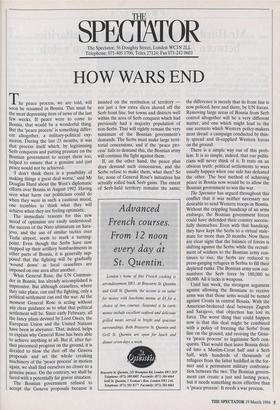SPEAT THE CT OR The Spectator, 56 Doughty Street, London WC1N 2LL
Telephone: 071-405 1706; Telex 27124; Fax 071-242 0603
HOW WARS END
The peace process, we are told, will soon be resumed in Bosnia. This must be the most depressing item of news of the last few weeks. If peace were to come to Bosnia, that would be a wonderful thing. But the 'peace process' is something differ- ent altogether, a military-political oxy- moron. During the last 23 months, it was that process itself which, by legitimising Serb conquests and putting pressure on the Bosnian government to accept them too, helped to ensure that a genuine and just peace would not be achieved.
`I don't think there is a possibility of making things a great deal worse,' said Mr Douglas Hurd about the West's diplomatic efforts over Bosnia in August 1992. Having seen what harm our politicians could do when they were in such a cautious mood, one trembles to think what they will achieve when they are feeling optimistic. The immediate reasons for this new mood of optimism are easily understood: the success of the Nato ultimatum on Sara- jevo, and the use of similar tactics over Tuzla airport, seem to mark a turning- point. Even though the Serbs have now stepped up their artillery bombardments in other parts of Bosnia, it is generally sup- posed that the fighting will be gradually `wound down' as local ceasefires are Imposed on one area after another.
What General Rose, the UN Comman- der in Bosnia, has already accomplished is impressive. But although ceasefires, where they take place, can end the fighting, only a political settlement can end the war. At the moment General Rose is acting without any clear guidance as to what that political settlement will be. Since early February, all the fancy plans devised by Lord Owen, the European Union and the United Nations have been in abeyance. That, indeed, helps to explain why General Rose has been able to achieve anything at all. But if, after fur- ther piecemeal progress on the ground, it is decided to blow the dust off the Geneva proposals and set the whole creaking machinery of the 'peace process' in motion again, we shall find ourselves no closer to a genuine peace. On the contrary, we shall be faced with a potentially far graver situation. The Bosnian government refused to accept the Geneva proposals because it insisted on the restitution of territory not just a few extra slices shaved off the Serb front line, but towns and districts well within the area of Serb conquest which had previously had a majority population of non-Serbs. That will rightly remain the very minimum of the Bosnian government's demands. The Serbs must make large terri- torial concessions, and if the 'peace pro- cess' fails to demand this, the Bosnian army will continue the fight against them.
If, on the other hand, the peace plan does demand such concessions, and the Serbs refuse to make them, what then? So far, none of General Rose's initiatives has actually rolled back Serb gains. The extent of Serb-held territory remains the same; the difference is merely that its front line is now policed, here and there, by UN forces. Removing large areas of Bosnia from Serb control altogether will be a very different matter, and one which might lead to the one scenario which Western policy-makers most dread: a campaign conducted by thin- ly spread and ill-supplied Western forces on the ground.
There is a simple way out of this prob- lem. It is so simple, indeed, that our politi- cians will never think of it. It rests on an obvious truth: political settlements to wars usually happen when one side has defeated the other. The best method of achieving peace in Bosnia now would be to allow the Bosnian government to win the war.
The Spectator has argued throughout this conflict that it was neither necessary nor desirable to send Western troops in Bosnia. Without the crippling handicap of an arms embargo, the Bosnian government forces could have defended their country success- fully themselves. Even with that handicap, they have kept the Serbs to a virtual stale- mate for more than 20 months. Now there are clear signs that the balance of forces is shifting against the Serbs: while the recruit- ment of soldiers to the Bosnian army con- tinues to rise, the Serbs are reduced to press-ganging refugees in Serbia to fill their depleted ranks. The Bosnian army now out- numbers the Serb force by 180,000 to 60,000. All it lacks is weapons.
Until last week, the strongest argument against allowing the Bosnians to receive arms was that those arms would be turned against Croats in central Bosnia. With the American-brokered deal between Zagreb and Sarajevo, that objection has lost its force. The worst thing that could happen now is that this deal might be combined with a policy of freezing the Serbs' front line on the ground, and reviving the Gene- va 'peace process' to legitimise Serb con- quests. That would then leave Bosnia divid- ed into a Muslim-Croat half and a Serb half, with hundreds of thousands of refugees from the latter huddled in the for- mer and a permanent military confronta- tion between the two. The Bosnian govern- ment can create a just and lasting peace, but it needs something more effective than a 'peace process'. It needs a war process.


























































 Previous page
Previous page